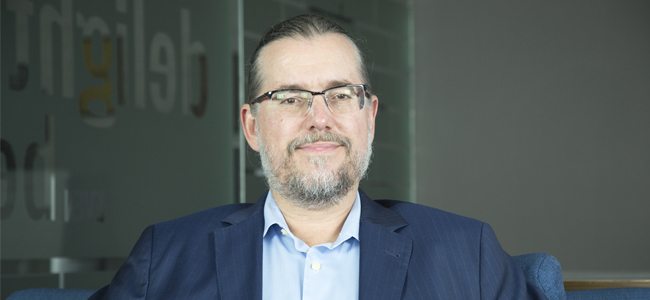Know Your Faculty
Senior Faculty at IPL..
Adjunct Faculty at Maastricht School of Management, Kuwait…
Coach at Negotiation Partners, Melbourne…
Consultant at Focus MC, UAE…
MBA Facilitator at Stafford Associates, GCC and Lebanon...
If these were not enough, Google rates him the best negotiation coach in the world!
Mind-boggling stuff, isn’t it? This is the wealth of knowledge and experience that Prof. Andrew Bean brings to the table. Andrew teaches Negotiation and Conflict Management classes for the EMBA cohorts at IPL. The editorial team managed to pull him aside for a small conversation on his stint at IPL and his life experiences.
Mind-boggling stuff, isn’t it? This is the wealth of knowledge and experience that Prof. Andrew Bean brings to the table. Andrew teaches Negotiation and Conflict Management classes for the EMBA cohorts at IPL. The editorial team managed to pull him aside for a small conversation on his stint at IPL and his life experiences.

Q: What does a Negotiation Skills coach do?
We help our clients to achieve better outcomes by training their executives, help them sharpen-up preparation for important deals and by leading critical negotiations on their behalf.
Q: What prompted you to get into teaching and coaching?
I found I really enjoyed seeing ‘the light go on’ when someone learns something new and useful. I am a physicist originally, but once I moved into management, quickly realised that ‘people are more complicated than electrons’. Coaching means working with motivated adult learners who are paying to be there, so they want to learn and can see the ROI of applying what they have learnt…that really gets me excited.
Q: Please tell us about your IPL experiences within the classroom and outside. What makes an education from IPL relevant in today's world?
Working with an enthusiastic group of learners who want to change not only their careers for the better, but their industry and country, is very humbling. The potential students who come along to a ‘Day in the Life…’ or the MBA students themselves, ask lots of great questions and think hard about how they can link their learning to their real-life situation. IPL is addressing a real need in India’s industrial architecture that will move everyone on to a more value-added stage of product leadership.
Q: Tell us something of Andrew that nobody knows about.
I worked as a newspaper delivery boy when I was 12 years old, earning the grand sum of $20 a week for 12 hours of 5-7am work, 6 days a week. It seemed a lot when I was 12, but it also taught me that hard labour is hard labour and the only way to better myself and get a job that let me see the world, at a better pay rate, was education. I am the first PhD in my family (my grandfather drove a truck) and one of my cousins is still a poorly paid farm labourer. How easily could I have ended up the same? This has made me a lifelong believer in education for all, as a great enabler of social mobility.
Q: As a sought-after negotiator, we know that you have worked with many governments on negotiating treaties and deals and you must have been through some interesting situations. Could you share one such interesting situation with us?
I remember a SE Asian nation that was just beginning to open up to international trade, after long isolation. When they were first raised the idea, everyone was hesitant, worried that they weren’t really interested in opening up and probably planned to make life difficult for foreign investors. But by starting with a first question of “Well, what is it, you the government want?” they opened up and revealed they were desperately keen for foreign investment, had no idea what to do (courtesy of their long isolation) and did not know an international law firm that would write foreigner-friendly investor laws, so that they could start getting inward capital investment going as quickly as possible…Not what anyone thought was going to happen! It ended up with the foreign law firm drafting the laws, then once they were legislated, going to an international investment conference and at 3 am shoving a copy (in English, not the country’s language) under the door of every room in the 5-star hotel, hoping to connect with every delegate. And so foreign investment started and continues very well to this day. Interestingly the law to allow international arbitration, rather than using the national courts, is still in place, just the way it was first drafted. Moral of the story: Everyone has power in a negotiation. If some-one is sitting down opposite you, then you have something they need. So no matter how big and powerful they may appear, you still have power, just like they do. And always ask lots of questions.
Q: What are the cultural differences you observe among professionals you interact with across the globe? How does one learn about these differences and work with them?
The first big difference is what is most important: relationships vs contracts. East vs West, North vs South as a very general approximation. Hofstede and Trompenaars have some useful academic models for understanding cultural differences. However, the key issue is just be aware that the person across the table will be thinking differently and you will have some blind spots, so be ready to be flexible. Do some research about what is important in their culture and try and watch some famous movies from that culture e.g. I always recommend Lagaan as important to understanding part of Indian culture. Then be friendly, ask lots of questions and be interested in their culture. People around the world are almost always trying to be nice to their guests and appreciate your interest. Above all don’t be patronising – your country’s way of doing things is not the best, it is only one way of solving the problem…it may be relevant, it may not. Remember that culture gets wrapped around the negotiation process. People are talking to you because you have something they want, and vice versa, so be aware of the well-known cultural issues. Be ready and prepared to negotiate, once they have done the cultural bits and decided if you have good will and they can trust you to behave in a manner that makes logical sense to their cultural lens.
Q: How important are negotiation skills for Product Managers?
Negotiation happens at all levels of business, from the big set-piece negotiation with clients and suppliers to the daily negotiations between business units, managers and staff, and contractors: negotiation is everywhere. To be effective as Product Managers you need to understand what negotiation is, realise you shouldn’t settle for win-win, avoid compromises, understand the importance of giving your team a clear mandate, and demand excellence.
Q: What is the one piece of advice you'd give IPLites on the best way to use their new skills and competencies?
Go out and start practising one or two learning points for the next couple of weeks. Once they are working for you, choose two more and practise them. Keep repeating until you have found what works for you and seen the ROI. Learning is a lifelong journey and aim for small steady changes and improvements. By being part of IPL, you have already demonstrated you have what it takes.
"In business and in life, you don’t get what you deserve; you get what you negotiate." Chester L. Karrass
We help our clients to achieve better outcomes by training their executives, help them sharpen-up preparation for important deals and by leading critical negotiations on their behalf.
Q: What prompted you to get into teaching and coaching?
I found I really enjoyed seeing ‘the light go on’ when someone learns something new and useful. I am a physicist originally, but once I moved into management, quickly realised that ‘people are more complicated than electrons’. Coaching means working with motivated adult learners who are paying to be there, so they want to learn and can see the ROI of applying what they have learnt…that really gets me excited.
Q: Please tell us about your IPL experiences within the classroom and outside. What makes an education from IPL relevant in today's world?
Working with an enthusiastic group of learners who want to change not only their careers for the better, but their industry and country, is very humbling. The potential students who come along to a ‘Day in the Life…’ or the MBA students themselves, ask lots of great questions and think hard about how they can link their learning to their real-life situation. IPL is addressing a real need in India’s industrial architecture that will move everyone on to a more value-added stage of product leadership.
Q: Tell us something of Andrew that nobody knows about.
I worked as a newspaper delivery boy when I was 12 years old, earning the grand sum of $20 a week for 12 hours of 5-7am work, 6 days a week. It seemed a lot when I was 12, but it also taught me that hard labour is hard labour and the only way to better myself and get a job that let me see the world, at a better pay rate, was education. I am the first PhD in my family (my grandfather drove a truck) and one of my cousins is still a poorly paid farm labourer. How easily could I have ended up the same? This has made me a lifelong believer in education for all, as a great enabler of social mobility.
Q: As a sought-after negotiator, we know that you have worked with many governments on negotiating treaties and deals and you must have been through some interesting situations. Could you share one such interesting situation with us?
I remember a SE Asian nation that was just beginning to open up to international trade, after long isolation. When they were first raised the idea, everyone was hesitant, worried that they weren’t really interested in opening up and probably planned to make life difficult for foreign investors. But by starting with a first question of “Well, what is it, you the government want?” they opened up and revealed they were desperately keen for foreign investment, had no idea what to do (courtesy of their long isolation) and did not know an international law firm that would write foreigner-friendly investor laws, so that they could start getting inward capital investment going as quickly as possible…Not what anyone thought was going to happen! It ended up with the foreign law firm drafting the laws, then once they were legislated, going to an international investment conference and at 3 am shoving a copy (in English, not the country’s language) under the door of every room in the 5-star hotel, hoping to connect with every delegate. And so foreign investment started and continues very well to this day. Interestingly the law to allow international arbitration, rather than using the national courts, is still in place, just the way it was first drafted. Moral of the story: Everyone has power in a negotiation. If some-one is sitting down opposite you, then you have something they need. So no matter how big and powerful they may appear, you still have power, just like they do. And always ask lots of questions.
Q: What are the cultural differences you observe among professionals you interact with across the globe? How does one learn about these differences and work with them?
The first big difference is what is most important: relationships vs contracts. East vs West, North vs South as a very general approximation. Hofstede and Trompenaars have some useful academic models for understanding cultural differences. However, the key issue is just be aware that the person across the table will be thinking differently and you will have some blind spots, so be ready to be flexible. Do some research about what is important in their culture and try and watch some famous movies from that culture e.g. I always recommend Lagaan as important to understanding part of Indian culture. Then be friendly, ask lots of questions and be interested in their culture. People around the world are almost always trying to be nice to their guests and appreciate your interest. Above all don’t be patronising – your country’s way of doing things is not the best, it is only one way of solving the problem…it may be relevant, it may not. Remember that culture gets wrapped around the negotiation process. People are talking to you because you have something they want, and vice versa, so be aware of the well-known cultural issues. Be ready and prepared to negotiate, once they have done the cultural bits and decided if you have good will and they can trust you to behave in a manner that makes logical sense to their cultural lens.
Q: How important are negotiation skills for Product Managers?
Negotiation happens at all levels of business, from the big set-piece negotiation with clients and suppliers to the daily negotiations between business units, managers and staff, and contractors: negotiation is everywhere. To be effective as Product Managers you need to understand what negotiation is, realise you shouldn’t settle for win-win, avoid compromises, understand the importance of giving your team a clear mandate, and demand excellence.
Q: What is the one piece of advice you'd give IPLites on the best way to use their new skills and competencies?
Go out and start practising one or two learning points for the next couple of weeks. Once they are working for you, choose two more and practise them. Keep repeating until you have found what works for you and seen the ROI. Learning is a lifelong journey and aim for small steady changes and improvements. By being part of IPL, you have already demonstrated you have what it takes.
"In business and in life, you don’t get what you deserve; you get what you negotiate." Chester L. Karrass
Facebook
Twitter
LinkedIn
Trending Posts
Tagged blogs




